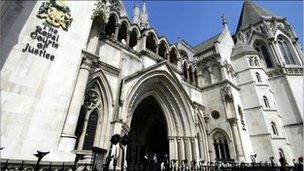Government loses abortion battle
- Published

Government loses battle over abortion figures at the High Court
The Department of Health has lost a court battle to keep secret some details on abortion statistics.
The government was challenging an Information Tribunal decision but data on late abortions must now be disclosed.
The court case follows an application by an anti-abortion group, the ProLife Alliance, for the publication of all data on abortion in England and Wales.
The Department of Health is considering whether to appeal against the ruling.
It said in a statement: "The Department will now consider the implications of this judgment and the options available."
Speaking outside the High Court, Josephine Quintavalle of the ProLife Alliance said: "The resistance of the Department of Health is extraordinary."
Protracted 'battle'
The case dates back nearly a decade, to the release of statistics on late abortions carried out in 2001.
Abortion on what is called "social" grounds is only legal in the first 24 weeks of pregnancy.
But the 1967 Abortion Act makes it legal to abort a foetus right up to birth if there is a substantial risk of "serious" physical or mental abnormality.
Up until 2003 the Department of Health published statistics on these late abortions, even when only one or two cases were involved.
But the publication of the figures in 2002 sparked an outcry when it became clear that one termination was carried out on a baby with a cleft lip and palate.
Critics argued that a relatively simple surgical procedure can now repair cleft palates, and anti-abortion groups argued the rules were being flouted to weed out "less than perfect" babies.
Josephine Quintavalle of ProLife Alliance: 'Victory for freedom of expression'
A police investigation was launched after a complaint by the Reverend Joanna Jepson, who herself was born with a jaw deformity.
By 2004, using information now in the public domain, journalists discovered the identity of one of the doctors involved in the abortion.
That led to fears that the identity of the patient could also be revealed.
Freedom of Information
Reflecting that concern, the Department of Health had already decided in 2003 it would no longer reveal detailed information on late abortions where the number of terminations involving certain medical conditions was less than 10.
The decision affected England and Wales, but it is also the practice in Scotland; while the Abortion Act does not apply in Northern Ireland.
In 2005 the ProLife Alliance (PLA), which opposes abortion, used the Freedom of Information Act to request the full statistics on abortions for 2003.
When the Department of Health refused, the Information Commissioner backed the PLA request, as did the Information Tribunal.
Eventually the case led to the High Court where the Department of Health has been trying to get the Information Tribunal decision overturned.
Dr Evan Harris, a pro-choice campaigner and member of the BMA's medical ethics committee, said it was "hard to see why successive governments" had fought the Information Tribunal decision.
"Patient confidentiality is paramount but there is no lawful way for patient identities to be made public merely by the occasional publication of late-stage abortion statistics, aggregated nationally," he told the BBC.
"There should be nothing to hide as late-stage abortions are rare and carefully considered."